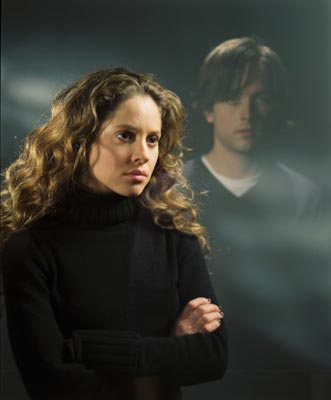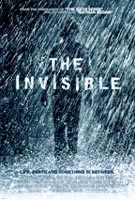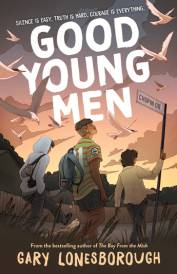David Goyer The Invisible Interview

Goyer?s Change of Pace.
by Paul Fischer in Los Angeles.David Goyer is one of Hollywood?s most sought after screenwriters. Best known for genre scripts such as the Blade movies and Batman Begins, Goyer utilized his power in Hollywood to direct a remake of a lesser known Swedish drama, re-titled The Invisible. The film centers around Nick, a high school senior with a bright future until, in a tragic case of mistaken identity, he is brutally attacked by a troubled girl, Annie, and his body is left for dead. Now in limbo, not quite dead but invisible to the living, his spirit can only watch as his mother and the police search frantically for him, unaware that he is only hours away from truly perishing and to survive, he will ironically need the help of the girl who assaulted him.
Paul Fischer caught up with Goyer in a boardroom at Disney studios.
Paul Fischer: So, Batman?
David Goyer: I?ll tell you the thing about Batman, and I mean this sincerely. The main reason why I?m not going to say anything is because Chris doesn?t want me to say anything.
Paul Fischer: So The Invisible doesn?t seem like a Goyer type movie.
David Goyer: Good.
Paul Fischer: What drew you to it and does it seem atypical for you?
David Goyer: Well, I think to the extent that the public is aware of me, they will think it?s atypical for sure. If you look at Batman Begins or the Blade movies or Dark City or any of that stuff, they?ll think, "What the hell?" But in terms of the movies that I watch or the books that I read or things like that, I?m sure you have varied interests as do I. So I don?t think it?s atypical for me.
Paul Fischer: It?s based on a novel, right?
David Goyer: It?s based on a novel, a Swedish novel, that has never been translated, that was then made into a Swedish film that was not released here.
Paul Fischer: Where did you see it?
David Goyer: I saw a bootleg tape of it about three years ago.
Paul Fischer: You?re admitting you saw a bootleg?
David Goyer: I know, a pirated videotape. Through a friend of a friend. And I just loved the movie. I thought it was going to go a certain way. In fact, at first I kind of rolled my eyes when I was watching the film 20 minutes in. I was like, "Oh, I know where it?s going." And then it didn?t go that way. And then there was another point in the film where I said, "Oh, I know where it?s going" and then it didn?t go that way. I just kept watching and watching and I really liked it. I really liked that it was, and I mean this in a good way, very European. It didn?t follow Hollywood conventions. So when I found out that Spyglass wanted to remake the film, I kind of chased it down. They were surprised that I wanted to do it but I argued very passionately to do it and convinced them.
Paul Fischer: Are there any Goyerisms in the film?
David Goyer: Well, the only Goyerism really is that in the garage scene, the character of Marcus is an auto mechanic and when he gets a call from Annie, if you look in the background, they?re working on the Blade car behind him.
Paul Fischer: Was this a blocking nightmare, things breaking and repairing in a single take, actors not paying attention to the lead?
David Goyer: I had no idea until we started filming how complicated it was going to be. I thought, ?Oh, this is going to be a nice little melodrama.? But once you realize, because we did our first scene and nobody can interact with the lead character but nobody can make eye contact with him. And especially when you?re dealing with scenes sometimes when you?ve got 50 or 60 extras and takes would be ruined because that person was looking at him, things like that, then after a few days, you realized "Oh my God, this is actually really complicated." Plus we did all sorts of in camera trickery. I didn?t want to do a lot of overt visual effects where he phases through walls or he looks like a specter or anything like that. But we did a lot of in camera trickery with motion control and things like that where he?s on one side of the room and then the camera moves over and there he is on the other side of the room. Obviously he broke the laws of physics to get there but we didn?t show it. So yes, there?s a scene in the movie where he gets angry at his mom and he throws the chair through the window, and we pan back to him and pan back to the window all in one shot and the window?s not broken. We did a number of things like that.
Paul Fischer: Did the Swedish version have tricks like that?
David Goyer: No, the Swedish version didn?t do anything in camera like that. It was all in cuts but I thought that was kind of fun. I don?t know if you noticed, the first three minutes of the movie are all one shot. Most audience members don?t notice but that was fun.
Paul Fischer: As a writer, to what extent are you a slave to the writer?s script as a director?
David Goyer: I think being a writer myself, I was more open minded and sympathetic to listening to what the writers had to say because I?ve had the experience of having my scripts get ruined. Now, I think the best scenario, when I worked with Guillermo del Toro or Chris Nolan or people like that, we would have a healthy but combative relationship which I think is good. That?s why Chris brought me onto Batman was so that he could have somebody to argue with and out of that would come the best material, so I really encourage that with the writers on this. I?m developing a number of things to direct that I?m not the writer on as well. I like that interchange. I think that?s good.
Paul Fischer: We won?t ask about the story of Batman, but how has the relationship with Chris on the new movie?
David Goyer: Well, the relationship was the same as the first one. We have a- - it?s just a great sense of mutual respect, all bets are- - we argue ferociously about things and it?s knock down drag out fights about things, but it?s good. We sit there when we?re working in his office or wherever we are and we just go back and forth and challenge each other and the best idea wins.
Paul Fischer: How hard is it to better yourself in a sequel with so many expectations?
David Goyer: It?s an enormous burden and something that we think about all the time.
Paul Fischer: And you?re conscious of it while you?re writing?
David Goyer: Sure. It?s scary. You get to a certain point and I really consider myself a fan as well, but even to the extent that I wanted to do, with The Invisible, it?s not a shot for shot remake but I really like the original film. I wanted to do it justice. I didn?t want to hack it out. The American audiences don?t know, they probably will never see the original film, but I really liked it. Or if I?m working on an adaptation of a book or a comic book that I really like, I consider myself a fan just like a lot of the audiences so I don?t want to let them down.
Paul Fischer: What?s going on with Green Arrow?
David Goyer: It's being written. I wish I had a more interesting answer than that. Just the writers started working like a week ago.
Paul Fischer: You?re calling it Supermax?
David Goyer: That's a working title.
Paul Fischer: What happened with The Flash?
David Goyer: Look, The Flash was just one of those- - it's so funny because it ended up happening the same day as Joss Whedon on Wonder Woman. We ended up a week later, two weeks later having lunch together, Joss and I. But fortunately, I'm in a place in my career where I can pick and choose what I want to do. I reached a point- - you know, when you start out, you just want to get a job or you just want to get your movie made or things like that. I reached a point, I don't know how many years ago, where if I got a set of notes that I really didn't believe in, I wouldn't do. So then either I walk or I don't walk or something like that. The Flash, I still have a great relationship with Warner Brothers. I turned around a month later and sold them Supermax. It just became apparent that we wanted to do two different stories.
Paul Fischer: Do you find it frustrating working with studios?
David Goyer: It can be frustrating but the blessing and the curse of working with library characters like that is you don?t own them. I have a number of original projects that I?m working on as well but if it?s a library character, it?s Batman, if it?s Superman, if it?s whomever, you don?t own those characters.
Paul Fischer: For the people who enjoy your work, what?s your schedule for the next year?
David Goyer: I wish I could- - I don?t know- - I will be directing something in the fall. I don?t know which one it will be yet.
Paul Fischer: Can you tell us the choices?
David Goyer: No.
Paul Fischer: Are we talking original material or library?
David Goyer: There?s actually both so I?m not being coy. There are a couple of balls in the air right now that will land in the next month or so. Right now I?m writing a remake of Scanners. I?m not directing that, for Dimension. And fortunately for me, but unfortunately for you, I?m working on a couple of secret projects that I can?t talk about.
Paul Fischer: How faithful will you be to the original Scanners?
David Goyer: That's an example, you asked about fans and things like that. Cronenberg is absolutely one of my favorite filmmakers. I love the original.
Paul Fischer: So you won't screw it up?
David Goyer: Well, I hope not. Interestingly enough with Scanners, Scanners is a great movie but it's also very dated to a certain extent. Largely in socio-political terms it's very dated. Cronenberg's movies are always very political and very specific. That original film had a lot to do with corporate America and the Reagan years and all of that stuff and that's not what's happening now. So my whole thing was, and I love that movie and I don't want to ruin that movie, so it's not a slavish remake. It's kind of taking the best stuff from that and trying to apply the same sociopolitical template. What I mean by that is you take the existence of scanners and pick up the newspaper right now and read about all the stuff that's going on in Iraq, or the stuff that's going on in the Justice department or Guantanamo Bay and all the rights that are being trampled on. That's what I'm trying to deal with in the remake of that.
Paul Fischer: Have you gotten David's blessing?
David Goyer: I haven't yet. I figured the best way to do it would be finish it and send it to him and either get his blessing or take my lashings.
Paul Fischer: We would have loved to see your version of Ghost Rider. Any feelings on how that came out and what your version was going to be?
David Goyer: Well, my version, which Stephen Norrington was going to direct, was a completely different movie. And Nic Cage was attached to both. Our version was The Haunted Mansion and Mark Steven Johnson is Pirates of the Caribbean. Ours was a super hard R and it was a horror film, just an outright horror film.
Paul Fischer: So the drinking, smoking...
David Goyer: Yeah, it was harder than Blade. It was really hard. So that would have been really fun. Would that have been as successful at the box office? Probably not.
Paul Fischer: Are studios not willing to take those risks and does it concern you? Is it frustrating when something like that happens, does it change the way you?re asked to write things?
David Goyer: Yes and no. It?s kind of cyclical because that happens and then 300 comes out and it?s going to do half a billion dollars worldwide and that was pretty hard R. Now everyone?s attitude in Hollywood is, "Oh, I guess that works." The cool thing about Scanners is, Bob Weinstein said, "Don?t hold back. It?s hard R."
Paul Fischer: But he?s Bob Weinstein.
David Goyer: But that?s fun. So with Scanners, it's just fun to know I can just go for it and I don't have to do the toned down version of it.
Paul Fischer: You?ll still blow up a head?
David Goyer: Of course we're going to blow up a head but we have to go further than blow up a head because we're 20 years down the line.
Paul Fischer: Are there any superhero characters you?d like to take a crack at, especially with the ability to do a hard R?
David Goyer: I could say something because it?s a wannabe. I would love to one day do an R rated Dr. Strange but who knows. Most of the ones that I?ve worked on, most of the ones I?ve done, I had an opportunity already to work on quite a few. I?m pretty sated in that regard.
Paul Fischer: Do you just have a 9 to 5 writing regimen?
David Goyer: I?m very regimented. I get up, usually I?ll write one thing from 9 to 11 and I?ll switch gears and write something else from 11 to 1. In the afternoon I?ll do, whether it?s this, I?ll do non writing. Whether it?s editing. Obviously I?m not writing when I?m shooting something but all the writing stuff happens from 9 to 1 and all the non-writing stuff happens from 1 to 6 or whatever.
Paul Fischer: Are you more creative in the morning? Is that why the schedule?
David Goyer: I?m a creature of habit and that?s just the way that worked for me and the way I?ve been doing it for 18 years so now it?s very regimented and very- - like I?m always by 9 behind the computer and I always finish by one. I found that it works best for me to create a very specific discipline and just stick to it like it?s a real job.
Paul Fischer: What challenges are there for you now as a writer and director? Is it tough to be as creative as when you started?
David Goyer: Well, one of the reasons why I started directing was just because that was an opportunity to learn and grow and do something different. I really, really, really like editing for instance. I?ve been fortunate as a writer to have been close to a lot of the directors I work with and be in the editing room but editing is really filmmaking. That?s really what- -
Paul Fischer: The essence of filmmaking?
David Goyer: It really is and I just love editing. It never ceases to amaze me how you can completely change a scene around or you can pull a close up from a completely different scene. It?s Eisenstein. It?s all of that stuff. I?m just endlessly fascinated by editing. I find that?s the part that I really enjoy.
Paul Fischer: How do you feel about your TV experiences? Would you try again?
David Goyer: Yes and you?re going to be reading about one in a few weeks.
Paul Fischer: Is Blade still on?
David Goyer: Blade is unfortunately not still on. It will come out on DVD. My TV experience has been somewhat frustrating because usually to the extent that I?ve done TV, it?s kind of too edgy for TV or doesn?t fit in the typical television box. But I?ll keep trying. I had a good experience, even though it was short lived, the pilot of Threshold. I was really proud of that. For some reason, people don?t know that I directed that but I did. That was really fun. It was fun- - it?s fun working in television because the pace is so different than features. I liken it to the difference between oil painting and watercolor. You?ve got to move so quickly in television, but I think that?s fun.
Paul Fischer: How is it as a creator to be recognized by fans?
David Goyer: That?s weird and it?s something that?s emerged over the last couple of years. Now if I?m out in public, there?s not a day that goes by where somebody- - that?s been weird. That?s been strange and I think the real thing that did it, obviously was the internet. It was also DVD extras because people would never necessarily know what I look like, but once you do these behind the scenes and things like that, that?s kind of weird.
Paul Fischer: So you can?t walk the Comic-Con floor?
David Goyer: No, I do that. But every once in a while I?ll be in a situation where somebody will come up to me in a restaurant or something. You?re just always worried, you never know what?s going to happen. I was actually talking about that with Christian Bale the other night because sometimes you?ll just bump into somebody on the street. It?s always been good so far.

The Invisible
The spirit of a semi-dead boy makes good in this WB-network-flavored tale, which is an adaptation of the young-adult novel by Swedish author Mats Wahl. A privileged and not very well-liked senior in his Seattle high school, brooding poet Nick (Justin Chatwin) winds up fingered for ratting out tough girl Annie (Margarita Levieva) to the cops for a jewelry heist. Soon his spirit is running loose trying to connect with the people around him, but only animals seem to notice everyone else just goes about their business. Meanwhile, his body is lying concealed in a sewer tunnel and Annie is the only one "invisible" enough to understand his pain.There?s a little blood here and there but overall this little TWILIGHT ZONE-ish tale is perfectly fine for the whole family, with some moral lessons about responsibility and the importance of emotional honesty. There?s enough damp Seattle mood to keep one watching, and Levieva brings a wealth of charisma and charm to her street-urchin role. Lots of great mopey alterna-rock on the soundtrack from the likes of Death Cab for Cutie, TV On the Radio, and Broken Social Scene keep the teen angst ratcheted to a sufficiently operatic high throughout.
MORE





